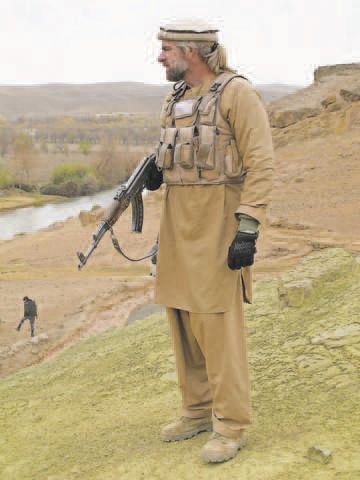By Lea Kahn, Staff Writer
Capt. Thomas O’Neil III, who graduated from Lawrence High School in 1992, spent two tours of duty in Iraq as an infantry officer in the U.S. Marine Corps. After his enlistment expired, he stayed on in Afghanistan in a civilian role., But the Afghan poppy fields left an impression on Capt. O’Neil. The Afghan farmers were protective of their poppy fields and would kill anyone who tampered with them. That’s because the flowers yield a substantial amount of the opium that circulates worldwide., “The poppy crops were important to them,” Capt. O’Neil told students in Lawrence High School history teacher Daniel Wolf’s class. As he spoke, an image was projected on a screen of Capt. O’Neil, dressed in civilian clothing and holding an AK-47 assault rifle in the middle of a poppy field., “From 1680 to 1776, that was the same attitude here (in Lawrence Township),” Capt. O’Neil told the students. The farmers who grew wheat and hemp in Maidenhead, which is the historic name for Lawrence Township, were protective of their crops. Hemp was especially valuable, because it was turned into rope for the ships in the British Navy., Soon, a conflict arose over ownership of the farmland in Maidenhead. The colonists thought they owned the land, which was “sold” to them by investors. But they had only purchased the right to farm the land, not to own it. When they were told that they owed more money in order to gain ownership, some disagreed and revolted., David Brearley, one of the Maidenhead farmers, was jailed for rioting, Capt. O’Neil told the students. One of his ancestors, Capt. John Anderson, was among the Maidenhead men that went to Trenton to rescue Mr. Brearley. The dispute was eventually settled., This was among the many conflicts between the colonists and the Crown that led to the American Revolutionary War. And naturally, there were divergent views on the issues of the day., Capt. O’Neil said that as the conflict began to heat up between the colonists and the Crown, the colonists took sides. Some sided with King George III and were known as Tories, he said. Those who opposed the King were called Whigs., In fact, Stony Brook was the dividing line between Tories and Whigs, Capt. O’Neil said. Princeton was full of Tories, he told the students. Lawrence/Maidenhead, Hopewell and Trenton sided with the Whigs., “In 1775, if you lived in Princeton, you did not go west of Stony Brook. If you crossed the creek, they would hang you,” Capt. O’Neil said., The Anderson family sided with the Whigs. Capt. O’Neil’s ancestors served in the Hunterdon County Militia and later in the 2nd Continental Army. (Mercer County did not exist until 1838. Maidenhead/Lawrence was in Hunterdon County.), Capt. O’Neil told the students that he was vaguely aware that his ancestors were involved in the battles of Trenton and Princeton, which are acknowledged to be the turning points of the Revolutionary War. But it was not until he returned home from Afghanistan that he became interested in finding out more about them., “I had this desire to investigate the story I heard. When I came back from Afghanistan, I came home to a country that was experiencing a lot of problems. I wanted to find out who I was,” he said., What he learned, Capt. O’Neil said, is that Private Ezekiel Anderson — his six-times grandfather — was one of the local men that led Gen. George Washington and troops through the back roads from Trenton to the Battle of Princeton on Jan. 2-3, 1777. Much of the land they marched through belonged to the Anderson family., Following the nearly back-to-back battles of Trenton, Gen. Washington pondered his next move. He consulted several Maidenhead men, including Private Anderson of the 2nd Continental Army, for a roundabout route to Princeton for a surprise attack on the British and Hessian troops stationed there., “The people I am descended from,” Capt. O’Neil told the students, helped to win the Revolutionary War. “We as New Jerseyans should be proud of it,” he said, adding that he “feels connected to the land from 300 years ago.”, It is that pride which led, in part, to Capt. O’Neil’s decision to trace Private Ezekiel Anderson’s footsteps — and Gen. Washington’s Continental Army — from Trenton to Princeton earlier this month, on the 240th anniversary of the Battle of Princeton. The event was known as Ezekiel’s March., Capt. O’Neil also told the students that African-American soldiers played an integral role in the fight for American freedom. About 25 percent of the soldiers in the Continental Army were African-Americans, which some of the students did not know., “We plan to hold Ezekiel’s March every year. It’s against racism. The Revolutionary War was won by black and white soldiers. We need patience, cooperation and understanding,” Capt. O’Neil told the students.

